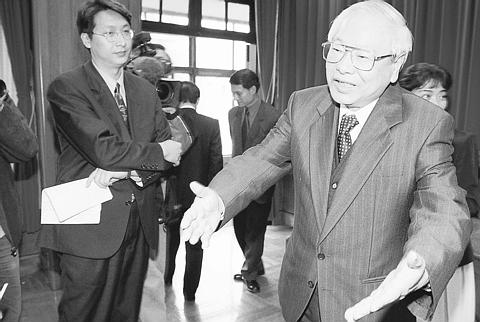Judicial Yuan officials yesterday dismissed accusations made by National Assembly deputies that the grand justices made "self-serving" interpretations of the Constitution.
They also expressed concern about the Assembly's proposal to abolish the Council of Grand Justices, warning that the passage of such an amendment would harm Taiwan's constitutional system.
The same Assembly deputies, whose proposal to abolish the Council passed committee review on Sunday, yesterday introduced another proposed amendment stating that the Council should remain in place, but that their life-long stipend guarantees should be cancelled.

PHOTO: CHEN CHENG-CHANG, TAIPEI TIMES
Speaking at a news conference yesterday, Judicial Yuan president Weng Yueh-sheng (
A group of Assembly deputies, including the party whips of the KMT and DPP, charged the Council of Grand Justices of "self-fattening" by making legal interpretations that entitled themselves to salaries for life, despite a system of limited terms for grand justices.
Such stipend privileges for grand justices were added into the organizational rules of the Judicial Yuan in 1992. The grand justices' stipend privileges were therefore passed by the legislature, not the Council itself, Weng said.
"No single one out of over 500 interpretations issued by the Council has ever interpreted the privileges or security of the grand justices. As for Interpretation No.396, cited by the Assembly deputies ? it has nothing to do with self-fattening," Weng said.
"[Grand justices' privileges] are a matter of governmental policy, not the intentions of the Council," Weng said. "In developed countries, the only fears over judicial officials' security is whether it is sufficient. The better the security, the more officials can perform their duties without misgivings or interference."
He also denied that the Council had pressured the legislature into making the law.
"It's impossible. How could the Council possibly have had the power to impose pressure on the legislature?" Weng said.
However, Weng's words were weighed against speculation by some that the Judicial Yuan was fighting back against the National Assembly.
"We are not criticizing [the Assembly deputies], only considering that such Constitutional amendments need to be clarified," he said.
Weng stressed that the current legal system was revisable, but that any reform requires a comprehensive plan. The current judicial system is not able to undertake the task of interpreting the Constitution, he said, and therefore the abolishment of the Council of Grand Justices would bring about a legal crisis and harm the public interest.
Grand Justice Chen Chi-nan (
"Should we accept such personal attacks?"Chen said.
On Sunday, Assembly deputies from the KMT and DPP reached a consensus to remove the life stipend guarantees of the grand justices, rather than to abolish the Council altogether as they had originally planned. In fact, the passage of the amendment to abolish the Council during Sunday's committee review session was only been meant to express deputies' discontent with the grand justices and is unlikely to pass second and third readings.
Many deputies were furious after the Council ruled in March that a set of amendments passed last year -- including one that extended the current Assembly's term by two years -- was invalid because it broke procedural rules.
Alex Tsai (

Intelligence agents have recorded 510,000 instances of “controversial information” being spread online by the Chinese Communist Party (CCP) so far this year, the National Security Bureau (NSB) said in a report yesterday, as it warned of artificial intelligence (AI) being employed to generate destabilizing misinformation. The bureau submitted a written report to the Legislative Yuan in preparation for National Security Bureau Director-General Tsai Ming-yen’s (蔡明彥) appearance before the Foreign Affairs and National Defense Committee today. The CCP has been using cognitive warfare to divide Taiwanese society by commenting on controversial issues such as Taiwan Semiconductor Manufacturing Co’s (TSMC, 台積電) investments in the

INVESTIGATION: The case is the latest instance of a DPP figure being implicated in an espionage network accused of allegedly leaking information to Chinese intelligence Democratic Progressive Party (DPP) member Ho Jen-chieh (何仁傑) was detained and held incommunicado yesterday on suspicion of spying for China during his tenure as assistant to then-minister of foreign affairs Joseph Wu (吳釗燮). The Taipei District Prosecutors’ Office said Ho was implicated during its investigation into alleged spying activities by former Presidential Office consultant Wu Shang-yu (吳尚雨). Prosecutors said there is reason to believe Ho breached the National Security Act (國家安全法) by leaking classified Ministry of Foreign Affairs information to Chinese intelligence. Following interrogation, prosecutors petitioned the Taipei District Court to detain Ho, citing concerns over potential collusion or tampering of evidence. The

‘COMPREHENSIVE PLAN’: Lin Chia-lung said that the government was ready to talk about a variety of issues, including investment in and purchases from the US The National Stabilization Fund (NSF) yesterday announced that it would step in to staunch stock market losses for the ninth time in the nation’s history. An NSF board meeting, originally scheduled for Monday next week, was moved to yesterday after stocks plummeted in the wake of US President Donald Trump’s announcement of 32 percent tariffs on Taiwan on Wednesday last week. Board members voted to support the stock market with the NT$500 billion (US$15.15 billion) fund, with injections of funds to begin as soon as today. The NSF in 2000 injected NT$120 billion to stabilize stocks, the most ever. The lowest amount it

NEGOTIATIONS: Taiwan has good relations with Washington and the outlook for the negotiations looks promising, Minister of Economic Affairs J.W. Kuo said Taiwan’s GDP growth this year is expected to decrease by 0.43 to 1.61 percentage points due to the effects of US tariffs, National Development Council (NDC) Minister Paul Liu (劉鏡清) said at a meeting of the legislature’s Economics Committee in Taipei yesterday, citing a preliminary estimate by a private research institution. Taiwan’s economy would be significantly affected by the 32 percent “reciprocal” tariffs slapped by the US, which took effect yesterday, Liu said, adding that GDP growth could fall below 3 percent and potentially even dip below 2 percent to 1.53 percent this year. The council has commissioned another institution